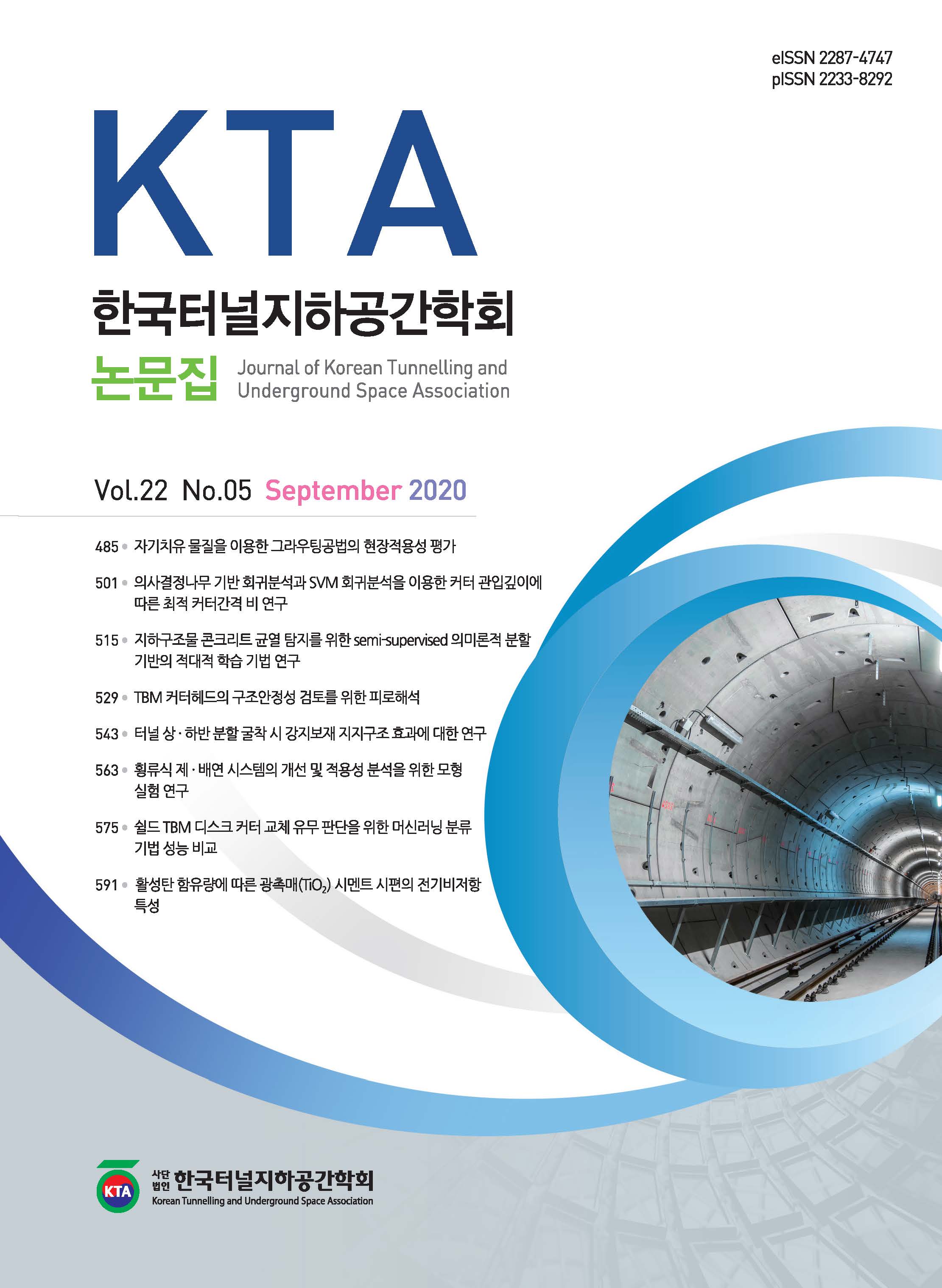(사)한국터널지하공간학회
- Log In/Sign Up
- P-ISSN2233-8292
- E-ISSN2287-4747
- KCI
 ISSN : 2233-8292
ISSN : 2233-8292
Article Contents
- 2024 (Vol.26)
- 2023 (Vol.25)
- 2022 (Vol.24)
- 2021 (Vol.23)
- 2020 (Vol.22)
- 2019 (Vol.21)
- 2018 (Vol.20)
- 2017 (Vol.19)
- 2016 (Vol.18)
- 2015 (Vol.17)
- 2014 (Vol.16)
- 2013 (Vol.15)
- 2012 (Vol.14)
- 2011 (Vol.13)
- 2010 (Vol.12)
- 2009 (Vol.11)
- 2008 (Vol.10)
- 2007 (Vol.9)
- 2006 (Vol.8)
- 2005 (Vol.7)
- 2004 (Vol.6)
- 2003 (Vol.5)
- 2002 (Vol.4)
- 2001 (Vol.3)
Modeling of rock dilation and spalling in an underground opening at depth
Abstract
This paper presents both numerical and physical modeling approaches for the dilation and spalling of rock recognized as typical process of rock around an underground opening at depth. For physical approach, laboratory testing of rectangular beams using a synthetic rock was used to investigate the onset of dilation and spalling. The beams are axially compressed and subjected to 4-point bending to provide non-uniform compressive stresses which are similar to the maximum tangential stress distribution around circular openings. Discrete element numerical analyses using commercial code PFC2D (Particle Flow Code) were performed to evaluate the stress path at various locations in the beams. The findings from these approaches suggest that the onset of dilation in laboratory tests appears to be a good indicator for assessing the stress magnitudes required to initiate spalling.
- keywords
- 암석팽창, 스폴링, PFC, 불연속체 해석, DEM, 4점 휨 시험, Dilation, spalling, PFC, discrete element method, 4-point bending, Dilation, spalling, PFC, discrete element method, 4-point bending
Reference
1. 박대성, 김영근 (2007), “암반응력의 분포특성을 고려한 터널거동 분석에 관한 연구”, 터널기술, 한국터널공학회 논문집, 제9권, 제3호, pp. 275-286.
2. 이강현, 방준호, 김진하, 김상호, 이인모 (2009), “지하공동의 취성파괴 예측을 위한 암석물성 및 손상지수 평가”, 터널기술, 한국터널공학회 논문집, 제11권, 제4호, pp. 327-351.
3. 천대성, 정용복, 박 찬, 전석원 (2007), “CWFS모델변수 결정을 위한 손상제어시험 및 이를 활용한 취성파괴모델링”, 터널기술, 한국터널공학회 논문집, 제9권, 제3호, pp. 263-273.
4. Andersson, J. C. (2007), “Äspö pillar stability experiment: rock mass response to coupled mechanical thermal loading”, PhD thesis, Royal Institute of Technology (Kungliga Tekniska Högskolan), KTH, Stockholm.
5. Brace, W. F., Paulding, B. and Scholz, C. (1966), “Dilatancy in the fracture of crystalline rocks”, J Geophys Res, Vol. 71, pp. 3939-3953.
6. Cho, N., Martin, C. D. and Sego, D. C. (2007), “A clumped particle model for rock”, Int J Rock Mech Min Sci, Vol. 44, pp. 997-1010.
7. Diederichs, M. S. (2000), “Instability of hard rock masses: the role of tensile damage and relaxation”, PhD thesis, University of Waterloo.
8. Dzik, E. J. (1996), “Numerical modeling of Progressive fracture in the compression loading of cylindrical cavities”, PhD, University of Manitoba.
9. Ewy, R. T. and Cook, N. G. W. (1990), “Deformation and fracture around cylindrical openings in rock - I. observations and analysis of deformations”, Int J Rock Mech Min Sci Abstr, Vol. 27, pp. 387-407.
10. Gay, N. C. (1973), “Fracture growth around openings in thickwalled cylinders of rock subjected to hydrostatic compression”, Int. J. Rock Mech. Min. Sci. Abstr, Vol. 10, pp. 209-233.
11. Hibbeler, R. C. (1997), “Mechanics of material”, Prentice Hall.
12. Hoek, E. (1965), “Rock fracture under static stress conditions”, National Mechanical Engi-neering Research Institute, Council for Scientific and Industrial Research, MEG383.
13. Lajtai, E. Z. (1974), “Brittle fracture in compression”, Int J Fracture Mech, Vol. 10, pp. 525-536.
14. Lee, M. and Haimson, B. (1993). “Laboratory study of borehole breakouts in lac du bonnet granite : a case extensile failure mechanism”, Int J Rock Mech Min Sci Abstr, Vol. 30, pp. 1039-1045.
15. Lipson, C. and Juvinall, R. C. (1963), “Handbook of stress and strength”, Macmillan.
16. Martin, C. D. (1997), “Seventeenth canadian geotechnical colloquium : the effect of cohesion loss and stress path on brittle rock strength” Can Geotech J, Vol. 34, pp. 698-725.
17. Martin, C. D. and Chandler, N. A. (1994), “The progressive fracture of lac du bonnet granite”, Int J Rock Mech Min Sci Abstr, Vol. 31, No. 6, pp. 643-659.
18. Martin, C. D., Martino, J. B. and Dzik, E. J. (1994), “Comparison of borehole breakouts from laboratory and field tests”, Proc. EUROCK’94, SPE/ISRM Rock Mechanics in Petroleum Engineering, Delft, A.A. Balkema, Rotterdam, pp. 183-190.
19. Martin, C. D., Martino, J. B. and Read, R. S. (1997), “Observations of brittle failure around a circular test tunnel”, Int J Rock Mech Min Sci, Vol. 34, pp. 1065-1073.
20. Martin, C. D., Kaiser, P. K. and McCreath, D. R. (1999), “Hoek-brown parameters for predicting the depth of brittle failure around tunnels”, Can. Geotech. J., Vol 36, pp. 136-151.
21. Potyondy, D. O. and Cundall, P. A. (2004), “A bondedparticle model for rock”, Int J Rock Mech Min Sci, Vol. 41, pp. 1329-1364.
22. RocScience Inc. (2002a) RocLab 1.007, http://www.rocscience.com.
23. RocScience Inc. (2002b) Phase2D, http://www.rocscience.com.
24. Santarelli, F. J. and Brown, E. T. (1989), “Failure of three sedimentary rocks in triaxial and hollow cylinder compression tests”, Int J Rock Mech Min Sci, Vol 26, pp. 401-413.
25. Sellers, E. J. and Klerck, P. (2000), “Modelling of the effect of discontinuities on the extent of the fracture zone surrounding deep tunnels”, Tunelling and Underground Space Technology, Vol. 15, pp. 463-469.
26. Tapponnier, P. and Brace, W. F. (1976), “Development of stress-induced microcracks in westerly granite”, Int J Rock Mech Min Sci Abstr, Vol. 13, pp. 103-112.
- Downloaded
- Viewed
- 0KCI Citations
- 0WOS Citations
